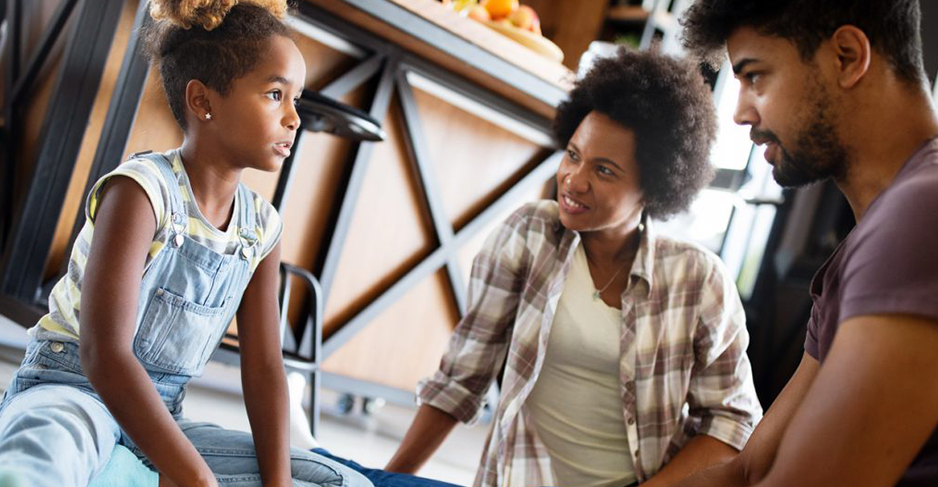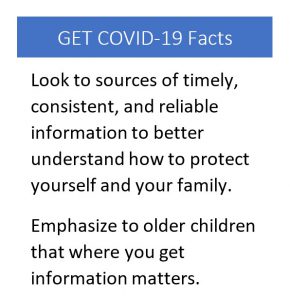Kitchen Conversations: How to Talk with Young Children About COVID-19
Posted on by
This pandemic has been a challenge for everyone. The COVID-19 outbreak has changed our daily lives in ways we never could have imagined. As a result, many of us are wearing multiple hats, including that of a homeschool teacher.
Children learn from adults outside of scheduled school time, too. Kids are observant. They soak in what’s around them and take their cues from the adults in their lives. In these situations, adults can lead by example in the ways we cope with stress and talk with others about COVID-19.
Parents, family members, and other trusted adults can play an important role to help children make sense of what they see and hear about COVID-19 in a way that is honest, accurate, and minimizes anxiety or fear. Let the kitchen table —either real or virtual— be a safe space to have open and reassuring conversations with kids. Here are some ways that you can minimize their stress and ease their worry about COVID-19:
Preparation & presentation
Before talking with kids about COVID-19, remember that children are not little adults. Presentation, tone, and word choice matter.
- Make yourself available to listen and to talk.
- Put restrictions on what and how much kids see or hear on TV, radio, and online.
- Be calm and reassuring.
- Use simple language that does not blame others and lead to stigma.
- Provide honest and accurate information.
- Explain that staying at home prevents disease from spreading
to others. - Use interactive methods like coloring books to explain what a
virus is.
Kitchen-table conversations
Talking about COVID-19 with children will probably bring up some questions. Adults can be more reassuring if they are prepared. CDC has published advice to help adults have conversations with children about COVID-19. Here is a list of possible questions that a child might have and some suggestions on how to answer them.
What is COVID-19?
“COVID-19 is the short name for a virus called coronavirus disease 2019. The capital letters ‘CO’ stand for corona, the capital letters ‘VI’ stand for virus, and the capital ‘D’ stands for disease. It’s a new type of coronavirus that we haven’t seen before. COVID-19 can be passed easily from one sick person to a healthy person by a cough, sneeze, or spit. That’s why it’s important for us to stay home right now, wash our hands a lot, and cover our coughs and sneezes.”
Why do I have to cancel my birthday party?
“Getting together in groups might spread germs that can make people sick right now. But we don’t necessarily need to cancel the party. Let’s have a virtual party instead. Maybe we can all get together in-person some other time.”
Why can’t we visit grandma and/or other family members?
“Sometimes, virus germs make older people like your grandparents sicker than younger people. For now, we can send a card or artwork, call on the phone, or video chat with them. Don’t worry. They understand that we’re being extra careful to make sure that they don’t get sick. We’ll be able to go see them again when fewer people are getting sick from the new virus.”
Why can’t I play with my friends (e.g., have a play date)?
“We have to be extra careful right now not to spread germs to our friends. It isn’t always going to be this way. When fewer people are getting sick from the new virus, we can start playing with our friends again. For now, let’s call or video chat with your friends to see how they’re doing. Afterward, how about you and I take a walk or go on a
bike ride.”
When will school open again?
“School buildings are closed to make sure that you, your friends and your teachers don’t get sick from the new virus. When fewer people are getting sick, you will be able to go back to school. I’m not sure when that will happen, but it will happen eventually. We’ll have to wait and see when the state government tells school principals that it’s safe for schools to open.”
What will happen if I get sick?
“You probably won’t get sick because you’re doing such a great job of staying home. Scientists and doctors think that most people will be okay, especially kids. If you got sick, we would give you medicine to make you feel better and make sure that you are getting lots of rest and plenty to drink. We would also need to be very careful to keep things that you touched clean.”
What will happen if you get sick?
“I probably won’t get sick because we’ve been staying home so much. If I did get sick, I would probably feel bad for a week or two. I might get a cough or have a fever. I would want to do my best to make sure that you didn’t catch the virus from me. So, I may need to stay in my room for a while, and we might need to be extra careful about how close we get to each other until I was feeling better. [Insert the name of another trusted adult] will take care of you if I
got sick.”
When will all of this be over?
“That’s a great question! No one knows when this will end because this kind of situation hasn’t happened in a long time. That’s why it’s so important for everyone to stay home right now to make sure that people don’t spread germs that can make other people sick. Our leaders, including scientists, are working very hard every day to try and get everything back to normal. We must be patient until happens. One thing that we know for sure is that this won’t last forever. One day, life will get back to the way it used to be.”
Keep the conversation going
The COVID-19 outbreak and other topics that can cause kids to worry will continue to be in the news, social media, and everyday conversations. So, it is important to keep the conversation you have with kids open-ended.
Check in with kids often to ask how they’re doing. Educate them about how their bodies fight disease (e.g., building a healthy immune system) and on the importance of good hygiene, such as effective handwashing.
This outbreak also gives adults an opportunity to talk to kids about the importance of staying informed in an emergency and how to process what they hear.
The struggle is real, but that’s okay!
We live in challenging times, but these challenges have the potential to bring us together and make us better people. As adults, each one of us can help children process this situation. Take the time to have an ongoing kitchen-table conversation about COVID-19 with your children, nephews, nieces or grandchildren. Together we can help children get through these challenges.
Resources
- Caring for Children: Tips to Keep Children Healthy While School’s Out
- Talking with children about Coronavirus Disease 2019
- Helping Children Cope with Emergencies
- Ready Wrigley: Coping After a Disaster
- Ask a Scientist Comic Series: How Does My Body Fight Disease?
Thanks in advance for your comments on this Public Health Matters post. Please note that the CDC does not give personal medical advice. If you are concerned you have a disease or condition, talk to your doctor.
Have a question for CDC? CDC-INFO (http://www.cdc.gov/cdc-info/index.html) offers live agents by phone and email to help you find the latest, reliable, and science-based health information on more than 750 health topics.
5 comments on “Kitchen Conversations: How to Talk with Young Children About COVID-19”
Comments listed below are posted by individuals not associated with CDC, unless otherwise stated. These comments do not represent the official views of CDC, and CDC does not guarantee that any information posted by individuals on this site is correct, and disclaims any liability for any loss or damage resulting from reliance on any such information. Read more about our comment policy ».


COVID-19 is such a scary thing for children and teenagers there are so many things that kids do not understand with this pandemic. As a pediatric mental health nurse there is such an increase in things such as anxiety and depression in kids during these unsure times. I think this blog does a great job of giving examples to open up the conversation between parents and their children to hopefully prevent the anxiety that children are feeling from becoming worse or turning into something even bigger. I think that doing your own research before talking with you children is important as they are bound to have questions and it helps if you have the answers ready at that time. I think that a great way to have this conversation is to use open ended questions when speaking with your children that way the conversation can go in a way that they want it to go.
This article provides excellent examples of how to introduce Covid 19 to children properly. Covid 19 has changed everyone’s lives. To children, they want to know why their world has become isolated. They have become familiarized with going places and having fun, and Covid 19 has caused a considerable shift. Parents have to educate their children on the truth of Covid 19. There is so much falsified information regarding Covid 19, and parents need to be honest with their children. This blog raised a good point about putting restrictions in place for what information children are receiving. There is a lot on TV about Covid 19 so parents can decide how and when they provide this information to their children.
it sucks
Since the COVID pandemic there have been a lot of changes in our daily lives, as adults we can acclimate to stress relatively easily, however for children it is a little harder. When the pandemic started and schools were getting canceled, I am sure that most younger children did not understand what was happening. One day they were going to school, playing sports and playing with their friends, then the next day they were told to stay home. Suddenly school was being held virtually and parents were having to stay home with their children to help facilitate online learning. Some parents are no longer able to work so now things that families could once afford are no longer being purchased. Children can see the stress parents are going through, which is why it’s important to talk to them and explain what is going on. COVID-19 is a scary thing, so it is important to explain what the virus really is. It is important to listen to children and address any concerns they may have in a calm, educational environment and to be honest with them.
Admit it, when a pandemic strikes, we need to think and do our hobbies to relax our minds. For me, cooking is the best option.